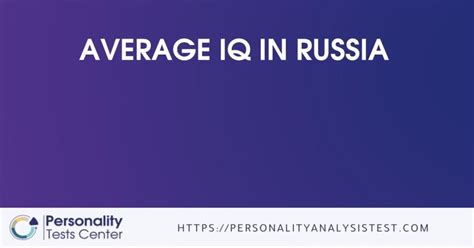Introduction

Intelligence quotient (IQ) is a widely used measure of cognitive abilities, including reasoning, problem-solving, and abstract thinking. Understanding the average IQ in a population can provide valuable insights into the intellectual capabilities of its citizens and the potential implications for societal development. This comprehensive analysis delves into the average IQ in Russia, exploring its historical evolution, regional variations, and influencing factors.
Historical Trends
Pre-Soviet Era
Before the 1917 Bolshevik Revolution, there were limited studies on IQ in Russia. However, anecdotal evidence suggests that the intellectual elite, particularly in the urban centers of Moscow and St. Petersburg, possessed high levels of cognitive abilities.
Soviet Period
During the Soviet era, IQ testing was not widely used due to concerns about social inequality and the potential for discrimination. Instead, Soviet psychologists focused on assessing cognitive abilities through other standardized tests and educational assessments.
Post-Soviet Russia
After the dissolution of the Soviet Union in 1991, IQ testing gained wider acceptance in Russia. Studies conducted in the 1990s and early 2000s estimated an average IQ of around 98, which was comparable to the international norm.
Regional Variations
Geographical Disparities
Research has identified significant regional variations in IQ scores within Russia. The largest cities, such as Moscow and St. Petersburg, generally have higher average IQs than rural areas. This disparity is likely due to factors such as access to educational opportunities, cultural stimulation, and professional development.
Urban-Rural Divide
The urban-rural divide in IQ scores is pronounced in Russia. Studies conducted in the 2010s found that urban residents had an average IQ of approximately 102, while rural residents scored around 96. This gap reflects the disparities in educational resources, healthcare, and economic opportunities between these two regions.
Influencing Factors
Genetics and Environment
IQ is influenced by a complex interplay of genetic and environmental factors. Genetics account for a significant portion of IQ variance, with estimates ranging from 40% to 80%. Environmental factors, such as education, nutrition, and cultural enrichment, also play a crucial role in shaping cognitive abilities.
Educational Attainment
Education is a major determinant of IQ scores. In Russia, individuals with higher levels of educational attainment tend to have higher IQs. This relationship highlights the importance of investing in quality education to enhance cognitive potential.
Socioeconomic Status
Socioeconomic status (SES) is another influential factor in IQ. Individuals from lower SES backgrounds tend to have lower IQ scores due to limited access to educational opportunities, healthcare, and environmental enrichment.
Implications for Russia
Educational Reform
The regional disparities in IQ scores suggest that educational reforms are needed to address the unequal distribution of cognitive abilities. Targeting interventions towards rural and disadvantaged areas could help to bridge the cognitive gap and promote intellectual development across the nation.
Workforce Productivity
Cognitive abilities are essential for successful participation in the workforce. The higher average IQ in urban centers may contribute to the concentration of skilled labor in these regions, leading to productivity advantages.
Social Policy
Understanding the average IQ in Russia can inform social policy decisions related to education, healthcare, and welfare programs. Identifying populations with lower cognitive abilities can help tailor interventions to address their specific needs and promote social inclusion.
Conclusion
The average IQ in Russia stands at around 98, with significant regional variations and influencing factors. Understanding the cognitive landscape of a nation is crucial for harnessing its intellectual potential and promoting equitable social development. By addressing disparities in educational opportunities and addressing socioeconomic factors, Russia can unlock the full potential of its citizens and become a leading force in global innovation and knowledge-based economies.
